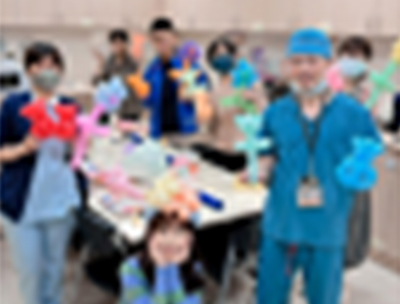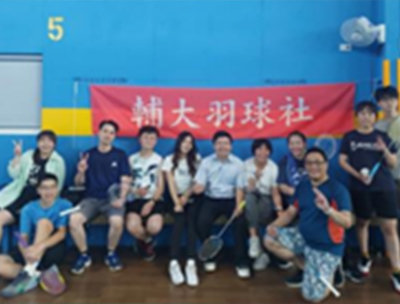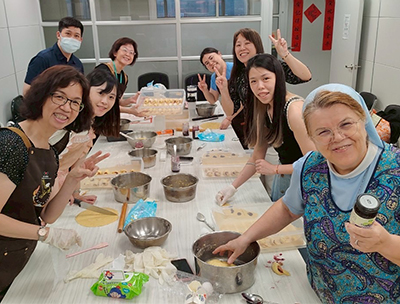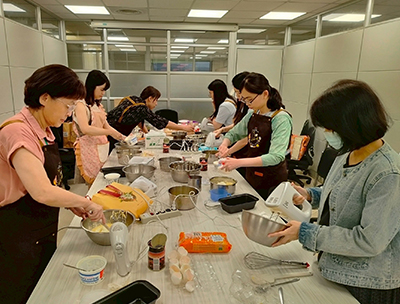Sustainability Purpose and Development Mission
Fu Jen Catholic University Hospital firmly believes that the foundation of high-quality healthcare is rooted in cultivating a joyful and resilient workplace. To this end, the hospital is committed to fostering an organizational environment grounded in compassion, mutual respect, and trust. Guided by the principle of holistic care, this ethos extends beyond patient care to embrace the overall well-being of employees.
The hospital promotes physical and mental health, supports professional growth, and nurtures an inclusive and diverse organizational culture. Through transparent communication mechanisms and robust labor rights protections, it actively builds a secure, friendly, and sustainable workplace—enhancing staff engagement, reinforcing team cohesion, and ultimately improving the quality of care delivered.
Looking forward, the hospital will accelerate digital transformation and explore flexible work models to promote work-life integration. By adopting a sustainability-oriented indicator system, it will continuously track, assess, and improve employee well-being outcomes. In doing so, the hospital aspires to achieve shared prosperity between staff and institution, and to evolve into a healthcare model defined by its humanistic warmth and sustainable competitiveness.
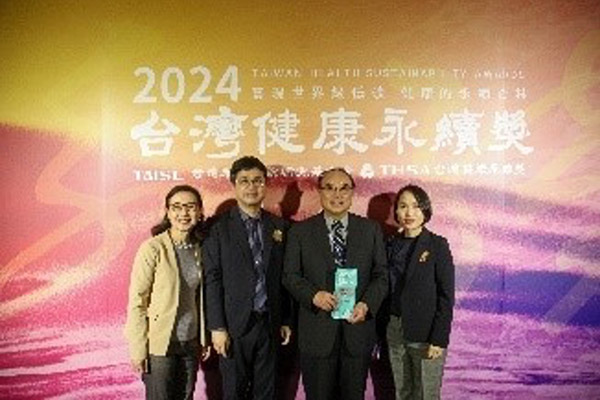
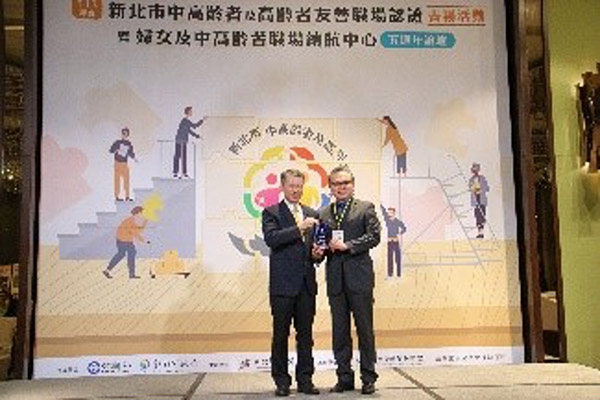

Employee Composition and Human Rights
Employee Structure
Fu Jen Catholic University Hospital is committed to building an efficient, stable, and resilient healthcare team to jointly fulfill its mission of providing care and achieving a sustainable vision. As of the end of 2024, the hospital employed a total of 1,925 staff members:
- Stable workforce foundation: More than 90% are full-time employees, with 146 part-time staff.
- Mature professional team: Employees aged 31 to 50 account for 50.8% of the workforce.
- High female participation: Women make up 71% of employees.
- Diversity and inclusion in the workplace: The workforce includes 12 individuals with disabilities (6 with severe or above conditions), 12 foreign nationals, and 33 Indigenous employees, representing 2.95% of total employment.
Human Rights Management Policy
FJCH emphasizes a "value-driven" approach to talent management, ensuring that recruitment, training, promotion, and all personnel policies adhere to the principles of fairness, diversity, and professional development. The hospital has also established transparent communication and feedback mechanisms, enabling employees to fully express their opinions and suggestions, thereby fostering the joint growth of both the organization and individuals.

Preventive Measures and Management Policies Against Unlawful Infringements
- Establishment of a Workplace Unlawful Infringement Prevention Task Force and development of corresponding emergency response SOPs.
- Regular implementation of anti-violence education programs and scenario-based drills.
- Installation of surveillance systems, deployment of additional security personnel, and enhanced patrols in high-risk areas as part of physical safety measures.
- Provision of psychological counseling and legal assistance for affected employees.
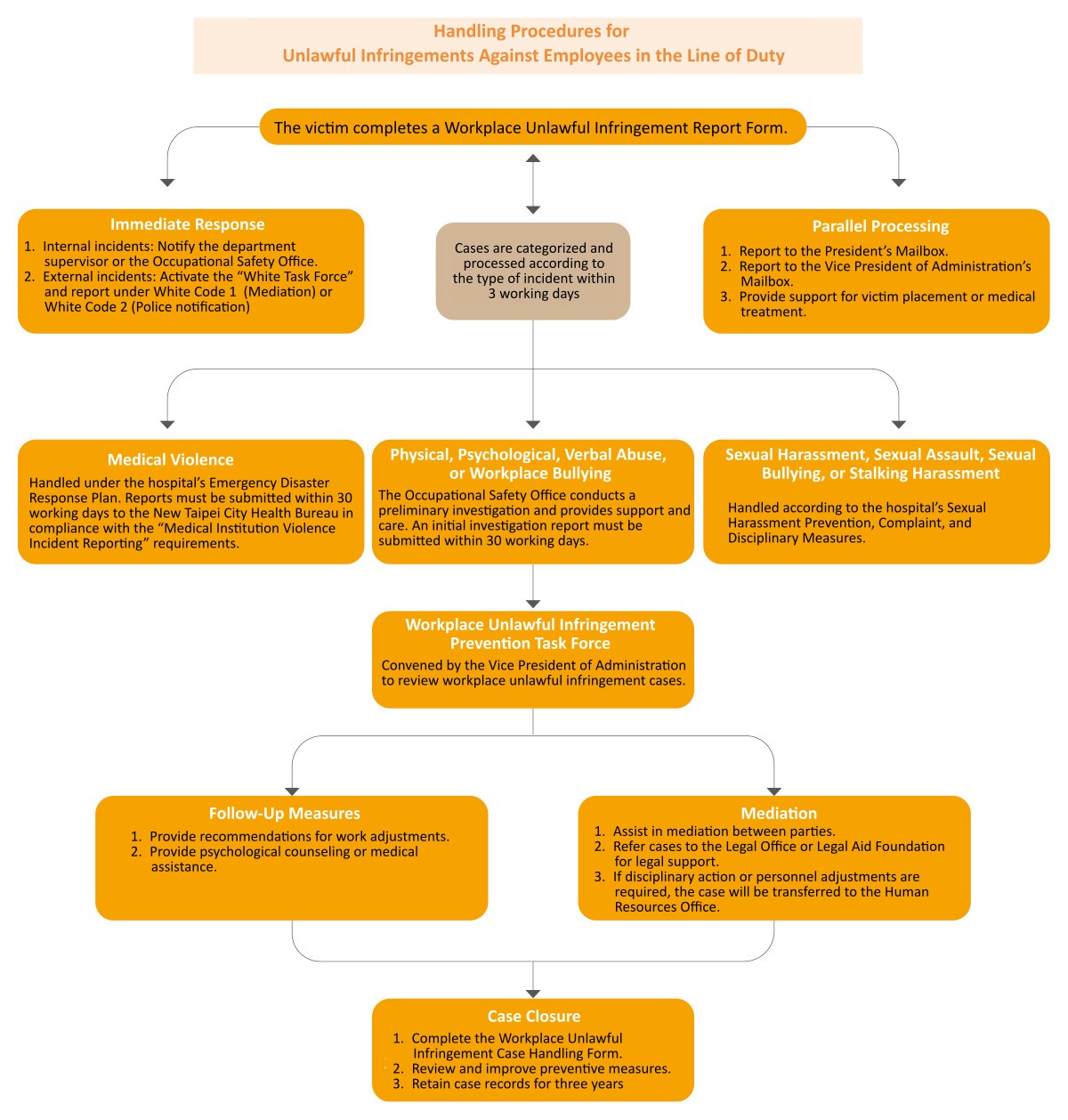
Sexual Harassment Prevention and Management Policy
- Formulation of the "Measures for the Prevention, Complaint, and Investigation of Sexual Harassment."
- Clear procedures established for complaints, investigations, confidentiality, and support measures.
- Regular inspections to ensure the safety of public spaces.
- Implementation of gender equality and sexual harassment prevention education and training programs.
Labor-Management Communication and Participation
The hospital has established dedicated grievance channels, including a complaint hotline (02-85128888#21504), an email account (
fjuhhr@mail.fjuh.fju.edu.tw
), and suggestion boxes.
In 2024, a total of 19 grievance cases were reported. All cases were handled by the responsible units, achieving a 100% response rate.
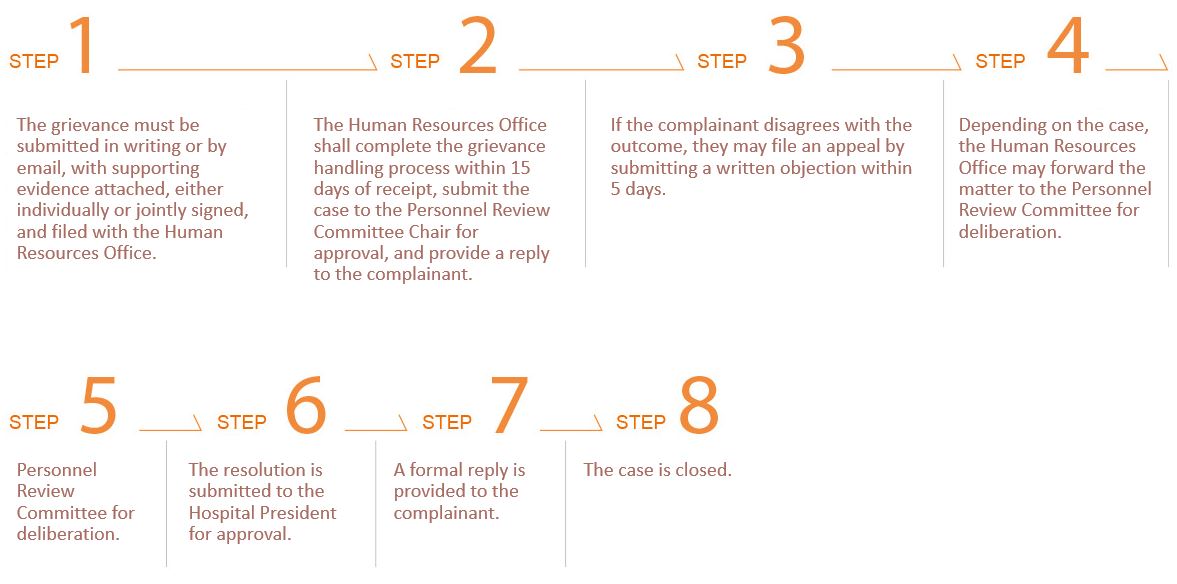
Employee Satisfaction Survey
In 2024, the employee survey achieved a response rate of 44.89%. Results indicated that employees gave the most positive feedback in the category of "job satisfaction", while "organizational climate" received relatively lower scores, highlighting a key area for future improvement.
Moving forward, the hospital will continue to strengthen employee communication and organizational cohesion through dialogue sessions and cross-departmental collaboration. In addition, the hospital will promote a series of "Happy Workplace" programs and activities to enhance organizational commitment and workplace belonging, thereby building a sustainable work environment characterized by high cohesion and strong sense of identity.
Labor-Management Communication and Dialogue Mechanisms
In 2024, the hospital convened four labor-management meetings to discuss and respond to employee concerns. The discussions covered topics such as welfare systems, working conditions, facility resources, and feedback mechanisms.
Talent Recruitment and Retention
Upholding the principle of transparency, FJUH recruits talent through multiple channels—including the official website, medical career platforms, campus recruitment events, and social media. Recruitment standards are established according to job requirements to ensure fairness, compliance with regulations, and equal opportunity principles, with a firm commitment to rejecting any form of discrimination or bias.
Training Programs
The hospital's training programs cover three levels: new employees, current staff, and leadership teams.
- New nursing and medical staff: Comprehensive onboarding training and mentorship programs are provided to help new employees quickly integrate into the team, become familiar with hospital culture, and adapt to workflows.
- Current employees: Regular professional skills enhancement courses and cross-disciplinary learning opportunities are offered. Employees are also encouraged to participate in domestic and international academic conferences and advanced studies to broaden their knowledge and perspectives.
- Middle and senior management: Specialized training in management, cross-departmental collaboration, and crisis management is provided to support leaders in effectively responding to the complexities and challenges of the healthcare environment.
Employee Education and Training
The hospital develops an annual training program of mandatory courses for all employees. The curriculum covers areas such as patient rights, gender equality, patient safety, medical ethics, holistic healthcare, infection control, child abuse prevention, workplace unlawful infringement prevention, ESG, and information security.
Training is delivered through a blended approach combining the Digital Learning Academy with in-person courses, providing employees with diverse learning channels. A team of professional instructors and course material developers ensures both the quality and effectiveness of the training.
Professional Training for Healthcare Personnel
For resident physicians and medical interns, the hospital provides comprehensive clinical training and supervision, emphasizing a learner-centered teaching model. By integrating simulation-based training with hands-on clinical practice, the program enhances clinical skills and responsiveness.
For faculty development among healthcare professionals, microteaching methods and live demonstration teaching are adopted, accompanied by effectiveness assessments and feedback mechanisms to ensure both teaching quality and learning outcomes.
To support employees in planning their career paths, Fu Jen Catholic University Hospital designs tailored development tracks based on each employee's professional background and interests. Through regular performance evaluations and career counseling, the hospital helps employees identify their potential, set career goals, and provides corresponding training and resource support.
To further strengthen the leadership of first-line and mid-level managers and to promote a workplace culture of respect and care, the hospital has organized the "Supervisor Empowerment Camp" annually since its establishment. For four consecutive years, each academic year has included this program, which provides continuous learning and exchange opportunities to accompany supervisors in steady professional growth and effective team leadership.
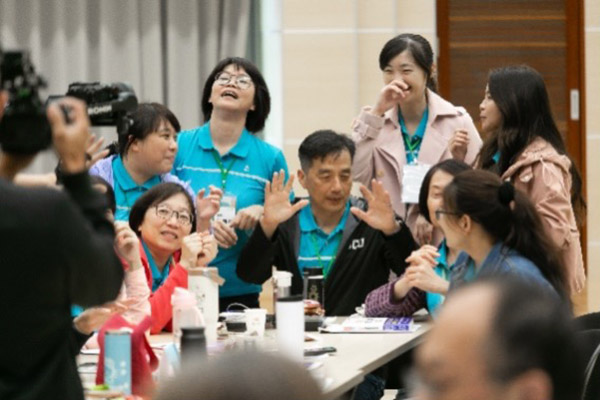
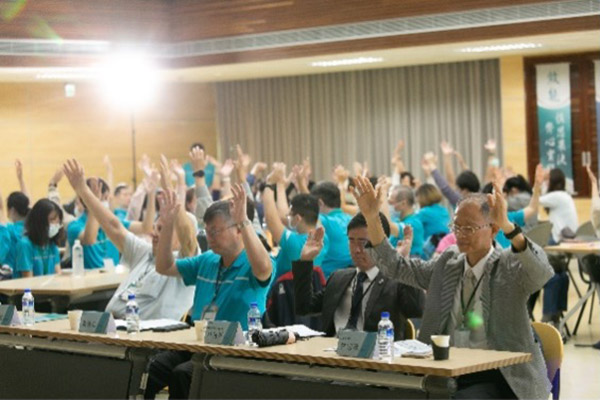
Workplace Safety and Health
Fu Jen Catholic University Hospital regards occupational safety and health as a fundamental cornerstone of healthcare quality, integrating it into medical services, teaching, research, and community engagement.
- The Occupational Safety and Health Office is staffed with dedicated management personnel.
- The Occupational Safety and Health Committee convenes regular meetings to deliberate on relevant policies and ensure effective implementation.
- Necessary personal protective equipment (PPE) and preventive medications are provided.
- Through education and training, awareness campaigns, and practical drills, the hospital strengthens employees’ knowledge and capacity to implement workplace safety and health practices.
FJUH has established multiple safety protection and response guidelines, including the Standard Operating Procedures for Handling Employee Accidents, the Employee Accident Prevention Measures, and the Infection Control Manual: Prevention of Sharps Injuries and Cuts. These resources provide employees with clear preventive and response instructions to follow in the event of workplace hazards.
At FJUH, the Infection Control Department is responsible for reporting and investigating needlestick incidents. Each case is handled in accordance with the Standard Operating Procedure (SP-6800-15001: Infection Control Procedures for Exposure to Medical Sharps and Blood/Body Fluids). Root cause analyses are conducted, and corresponding corrective measures are implemented.
- Diverse Employee Clubs: 17 clubs established, covering areas such as sports, arts and cultural creation, baking, and balloon art.
- Activities to enhance employee well-being: A workplace health promotion mechanism has been developed, encompassing diverse programs such as health promotion, psychological support, first aid response, spiritual care, and physical exercise.
- Launch of the "Spiritual Care Seed Teacher Training Program": Workshops are conducted to integrate theoretical and practical knowledge on spiritual care and self-care, fostering team-based discussions and learning.
- Active participation in community events: Employees joined the 10th New Taipei City Occupational Safety Cup Road Run.
